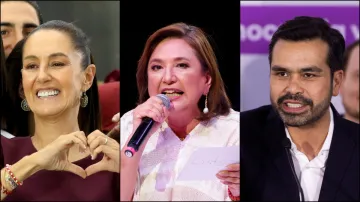Mexico to elect first woman leader in historic election: Here's everything you need to know
As many as 37 political candidates have been assassinated ahead of the Mexico's historic presidential election on Sunday, where voters are likely to pick the country's first woman leader. The winner will face challenges on multiple fronts, from violence and economy and foreign relations.

Mexico City: Mexican voters are poised to elect their first female leader as the country goes for its first female President as the country goes for presidential polls on Sunday, which is a cause for celebration but has also sparked a flurry of false and misogynist online claims. The leading candidates - both women - have had to respond to demeaning attacks about their appearances, credentials and their ability to lead the nation.
The run-up to the presidential election was marred with bloody violence, as a candidate was murdered at a political rally on Friday, taking the number of assassinated candidates to 37 ahead of Sunday's vote. Jorge Huerta Cabrera, a candidate who was running for a council seat in the town of Izucar de Matamoros, was gunned down in an attack, according to the state prosecutor's office. Cabrera's death makes this year's election the deadliest, with one more casualty than the 2021 midterm election.
The issue of violent crime has emerged as one of the top issues in this year's presidential contest, in which the ruling party of outgoing President Andres Manuel Lopez Obrador has been forced to defend a persistently high murder rate, as the opposition has sought to use the bloodshed to argue for change.
The issue of violent crime has emerged as one of the top issues in this year's presidential contest, in which the ruling party of outgoing President Andres Manuel Lopez Obrador has been forced to defend a persistently high murder rate, as the opposition has sought to use the bloodshed to argue for change. The country will likely elect its first female president on Sunday, along with 20,000 congressional and local positions that are up for grabs.
Who are the contenders?
Claudia Sheinbaum
Sheinbaum, 61, is a member of Obrador's Morena Party and a climate scientist and a policymaker who shared the 2007 Nobel Prize for Peace for their work on the United Nations Intergovernmental Panel on Climate Change (IPCC). Sheinbaum, who is most favoured to win the presidency, has previously served as the environmental minister of Mexico City in 2000 and the city's mayor from 2018 to 2023. If she wins, she would become the first Mexican female president with Jewish heritage.
Sheinbaum has promised to continue Obrador's policies, including his pension programme for senior citizens, expanding apprenticeships for students to dissuade them from joining drug cartels, providing free fertilisers for small-scale farmers and implementing comprehensive security reforms. Despite being close to the incumbent president, she has maintained her own leadership style, distancing herself from her possible predecessor.
Xóchitl Gálvez Ruiz
Gálvez, 61, is an outspoken former senator, a successful businesswoman and a fierce critic of Obrador's policies, particularly his "hugs not bullets" approach with drug cartels. She is backed by a coalition of parties which dominated Mexican politics in the 2000s. Coming from a poor household, Gálvez served as mayor of Miguel Hidalgo, one of the districts of Mexico City, between 2015 and 2018 before winning a seat in the upper house of Congress. She has advocated for a universal social protection system with a focus on strengthening local law enforcement agencies.
Her policies include the implementation of a social welfare system for the middle and lower classes, prioritising renewable energy initiatives and strengthening local and state police forces to address security challenges. At the same time, she has criticised the left-wing populist's security strategy, saying "ovaries are needed" to confront organised crime.
Jorge Álvarez Máynez
Maynez is a newcomer to the presidential race in Mexico, but has grabbed attention due to his bold policy proposals and progressive vision for Mexico's future. The 38-year-old politician has called for strengthening police forces, decriminalising simple drug possession to address poverty and reduce incarceration rates, renewed focus on police training and community engagement, and progressive tax reforms to address economic inequality.
What is at stake in the election?
Under López Obrador, Mexico has more than doubled its still-tragically low minimum wage to about $15 per day and his Morena party is pitching market-oriented policies like manual labour, subsidies and state-run companies that have helped the poor, leading to his widespread popularity. The larger issue remains the country's historic homicide rate, which is as high as ever, with more than 30,000 killings per year nationwide.
Obrador says fighting the drug cartels — which have taken over large swaths of Mexico, extorting protection money from all walks of life — is a foreign idea, one imposed on Mexico by the United States. He has limited cooperation with US authorities in fighting the gangs, but this policy has failed to curb the violence that has gripped the country.
Whoever wins the elections will face challenges on multiple fronts, from violence and economy to a future economic policy. They must tackle Obrador's less confrontational approach to drug cartels, costly infrastructure projects criticized for their environmental damage, and disputes with major trading partners the United States and Canada over policies that allegedly put foreign companies at a disadvantage.
The next president will have to balance a precarious national budget, with a large deficit this year, while promising to deepen welfare programs. Mexico is also in the midst of an unprecedented water crisis, with reservoirs running low and widespread shortages. There are also ongoing tensions with the US over a decades-old water-sharing treaty. Sheinbaum or Galvez could also face increased scrutiny on how they approach abortion and violence against women.
(with inputs from agencies)
ALSO READ | Mexico likely to elect first woman president: Meet the two female candidates in violence-marred election